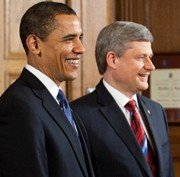
Some of the world's most powerful nations are refusing to sign a treaty that aims to increase the use of renewable energy worldwide.
The US, UK and Canada, along with Japan, Russia and Australia, have so far rejected the International Renewable Energy Agency (IRENA), which will be formally established today in Bonn, Germany. It will focus exclusively on renewable energies and aims to close the gap between their potential and their current use. With an intitial budget of 25 million Euros ($40.2 million CAD), it also aims to provide advice and assistance to developing countries in harnessing their own renewable energy supply.
Approximately 55 countries are expected to sign the founding treaty, including Germany, France, Spain, the Netherlands, Denmark and New Zealand, along with developing nations such as Pakistan, Thailand, Chad and Vietnam.
Germany's Federal Environment Minister, Sigmar Gabriel, said: "Many countries have recognised the opportunities which renewable energies offer for climate protection, security of supply, economic growth and employment. IRENA gives renewables an international voice and political impetus. The Agency will be the global platform for renewable energies."
Sounds good, right? So why not join?
According to the Canadian newspaper Embassy, one of the primary reasons given by Canada for rejecting the treaty is that it already belongs to organizations with the same goals, notably the UN-backed International Energy Agency. The UK and US are also part of the IEA.
However, according to the UK's BusinessGreen.com, agency representatives argue the IEA is more focused on fossil fuels than renewable energy - with just two per cent of its budget given to renewables - and that this was one of the reasons why IRENA was founded in the first place.
Something else that sets IRENA apart from previous organizations is the range of its membership, which encompasses both developed and developing nations. The IEA currently has 28 members, mostly rich European countries; IRENA is starting up with around 55.
"Today's event sends a strong signal for joint action by the global community on an international energy policy which also gives the poorest countries access to clean energy, thus contributing to the alleviation of poverty," said Germany's Federal Development Minister Heidemarie Wieczorek-Zeul.
Delegates from 116 countries are taking part in today's events, providing hope that more countries will join IRENA. There are hopes that the US will join once President Obama is more established at the White House - given Obama's vocal endorsement of environmental policies - and the UK is reportedly considering signing, but wants to learn more before commiting.
Compared with countries like Denmark and Germany, Canada has been lagging behind in promoting renewable energy development under the Harper government. Ignoring this chance to be part of such a positive force for change is sadly indicative of the government's present laissez-faire attitude towards the environment.
The US, UK and Canada, along with Japan, Russia and Australia, have so far rejected the International Renewable Energy Agency (IRENA), which will be formally established today in Bonn, Germany. It will focus exclusively on renewable energies and aims to close the gap between their potential and their current use. With an intitial budget of 25 million Euros ($40.2 million CAD), it also aims to provide advice and assistance to developing countries in harnessing their own renewable energy supply.
Approximately 55 countries are expected to sign the founding treaty, including Germany, France, Spain, the Netherlands, Denmark and New Zealand, along with developing nations such as Pakistan, Thailand, Chad and Vietnam.
Germany's Federal Environment Minister, Sigmar Gabriel, said: "Many countries have recognised the opportunities which renewable energies offer for climate protection, security of supply, economic growth and employment. IRENA gives renewables an international voice and political impetus. The Agency will be the global platform for renewable energies."
Sounds good, right? So why not join?
According to the Canadian newspaper Embassy, one of the primary reasons given by Canada for rejecting the treaty is that it already belongs to organizations with the same goals, notably the UN-backed International Energy Agency. The UK and US are also part of the IEA.
However, according to the UK's BusinessGreen.com, agency representatives argue the IEA is more focused on fossil fuels than renewable energy - with just two per cent of its budget given to renewables - and that this was one of the reasons why IRENA was founded in the first place.
Something else that sets IRENA apart from previous organizations is the range of its membership, which encompasses both developed and developing nations. The IEA currently has 28 members, mostly rich European countries; IRENA is starting up with around 55.
"Today's event sends a strong signal for joint action by the global community on an international energy policy which also gives the poorest countries access to clean energy, thus contributing to the alleviation of poverty," said Germany's Federal Development Minister Heidemarie Wieczorek-Zeul.
Delegates from 116 countries are taking part in today's events, providing hope that more countries will join IRENA. There are hopes that the US will join once President Obama is more established at the White House - given Obama's vocal endorsement of environmental policies - and the UK is reportedly considering signing, but wants to learn more before commiting.
Compared with countries like Denmark and Germany, Canada has been lagging behind in promoting renewable energy development under the Harper government. Ignoring this chance to be part of such a positive force for change is sadly indicative of the government's present laissez-faire attitude towards the environment.











No comments:
Post a Comment